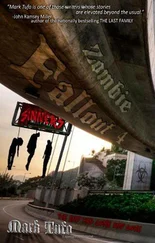When Roland returned to Benny’s office, he was only more than happy to be back there giving his feet a rest. “You know how many miles a day I walk around in this building?” he asked Benny. “How many?” said Benny. “I don’t know,” he said. “I never counted.” “You should get one of those pedometers,” said Benny. Two hours later they had finished the rough layout of an ad Joe Pope needed first thing in the morning. Benny’s moratorium on clicking would be over by the morning, and he could put the finishing touches on the ad then. So that’s how he did it. The whole day and not one click for Benny. Except he ruined it at a quarter to five when he allowed himself to check numbers on fantasy baseball.
“You know,” said Amber Ludwig, “I don’t find this story very amusing. What if Tom Mota comes back here and one of our security guys is inside your office putting an ad together?” she asked. “I’m so sure that makes me feel real safe, Benny.”
“Oh, Amber,” said Benny. “Tom Mota’s not coming back here.”
Suddenly Joe Pope appeared in Benny’s doorway. “Morning,” he said.
“Oh!” Amber shrieked instinctively, gripping her pregnant belly. She wasn’t showing, we shouldn’t have known the first thing about it, but we did because we knew everything. “Oh, Joe,” she cried. “You scared me!”
“Sorry,” said Joe. He stood in the doorway with his right pant leg still cuffed against the threat of grease. Joe Pope rode his bicycle into work on all but the most inclement days. Most mornings he came up the elevator like a courier with his sleek fluorescent helmet and his cuffed leg and his daypack. He walked the bike down to his office and parked it against the wall. Then he locked the front tire to the frame. Inside the office he did that, locked his bicycle, like he was beset on all sides by thieves and barbarians. That bicycle was the only personal item in Joe Pope’s office. He had no posters, postcards, doodads, snow globes, souvenirs, framed pictures, art reproductions, mementos, no humor books on the shelves and nothing to clutter his desk. He had been in that office three years, and it still looked temporary. Every day we had to wonder — who the hell was this Joe Pope, anyway? It wasn’t that we had anything against him. It was just that he was maybe an inch shorter than he should have been. He listened to weird music. We didn’t know what he did on the weekends. What sort of person showed up on Monday and had no interest in sharing what transpired during the two days of the week when one’s real life took place? His weekends were long dark shadows of mystery. In all likelihood, he spent his days off in the office, cultivating his master plan. Mondays we’d come in refreshed and unsuspecting and he would already be there, ready to spring something on us. Maybe he never left. Certainly he never came around with a coffee mug to palaver with us on a Monday morning. We didn’t judge him for that, so long as he didn’t judge us for our custom of easing into a new workweek.
When he did come around, it was only to say things like “Sorry to interrupt, Benny, but did you happen to put that ad together for me yesterday?”
“Got it right here, Joe,” trumpeted Benny, with a sly wink in our direction as he handed over Roland’s handiwork.
Joe’s sudden presence was the dissolving agent, and we picked our individual bodies up and returned to our desks, heavy and yawning. Morning was officially upon us.
Why was it so terrifying, almost like death, one morning of a hundred, to walk back to your own office and pass alone through its doorway? Why was the dread so suffocating? Most days, no problem. Work to be done. A pastry. Storm clouds out the window that looked, in their menace, sublime. But one out of a hundred mornings it was impossible to breathe. Our coffee tasted poisonous. The sight of our familiar chairs oppressed us. The invariable light was deadening.
We fought with depression. One thing or another in our lives hadn’t worked out, and for a long period of time we struggled to overcome it. We took showers sitting down and couldn’t get out of bed on weekends. Finally we consulted HR about the details of seeing a specialist, and the specialist prescribed medication. Marcia Dwyer was on Prozac. Jim Jackers was on Zoloft and something else. Dozens of others took pills all day long, which we struggled to identify, there were so many of them, in so many different colors and sizes. Janine Gorjanc was on a cocktail of several meds, including lithium. After Jessica’s death, Janine and her husband, Frank, divorced. We understood divorce to be a common repercussion of the death of a child. There was no bitterness between them, just a parting of ways. Now they each lived alone with their memories. Pictures of Frank with Jessica also hung in Janine’s office, and, to be honest, it was almost as moving to see pictures of him as it was to see all the ones of the lost girl. Frank with Jessica on his knee, Frank caught in an apron with hot mitts on his hands during some holiday — that man was as gone from the world as Jessica was. The woolly sideburns were gone and the thick black glasses were gone and he no longer had a wife or child. Spend two minutes in Janine’s office looking over those pictures and contemplating the destinies of the happy people involved, and you too would reach for one of the prescription containers scattered about the place.
Yet for all the depression no one ever quit. When someone quit, we couldn’t believe it. “I’m becoming a rafting instructor on the Colorado River,” they said. “I’m touring college towns with my garage band.” We were dumbfounded. It was like they lived on a different planet. Where had they found the derring-do? What would they do about car payments? We got together for going-away drinks on their final day and tried to hide our envy while reminding ourselves that we still had the freedom and luxury to shop indiscriminately. Invariably Tom would get drunk and berate the departing with inappropriate toasts. Invariably Marcia would find hair bands on the jukebox and subject us to their saccharine ballads while recalling the halcyon days of George Washington High. Invariably Janine would silently sip her cranberry juice, looking mournful and motherly, and Jim Jackers would crack dull, tasteless jokes, and Joe would still be at the office, working. “‘Every ship is a romantic object,’” Tom would blather, “‘except that we sail in.’” Concluding, he would stand and lift his glass. “So good luck to you,” he toasted, finishing off his martini, “and fuck you for leaving, you prick.”
WE HAD WIDE HALLWAYS. Some contained offices running along both sides, while others had offices on one side and cubicles on the other. Jim Jackers’ cubicle was unique in that it was set off in a corner. He had a wonderful view because of that location and we questioned whether he deserved it. To get there you had to walk past the toner stain in the carpet on sixty. He shared that prime space with one other person, a woman named Tanya something who worked on a different partner’s team. A retractable wall separated them, made of thick privacy glass, the kind used in shower windows. Behind it, one moved about, it seemed to the other, as if scrubbing and deodorizing, when really they were just filing or inputting.
We were into the first few weeks of layoffs when Benny told us the story of Carl Garbedian saying good-bye to his wife. We were gathered at Jim’s cube for some arbitrary reason — it was a mystery how and why some of us found ourselves gathering at the same place at the same time. Benny’s stories were more frequent in the days before the downturn, when we felt flush and secure. We were less mindful of being caught gathering. Then the downturn hit, our workload disappeared, and, though we had more time than ever to listen to Benny’s stories, we were more conscious of being caught gathering, which was one indication that our workload had disappeared and that layoffs were necessary. We were in a bind — what to do about Benny’s stories? We compromised by continuing to listen, but without enjoying them because we were too worried someone would come by and see us. We would listen with only one ear, and with one eye always over our shoulders, in case we needed to bolt back to our desks and commence the charade that our workload was as strong as ever, because only then would we not be laid off.
Читать дальше












